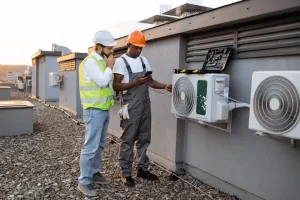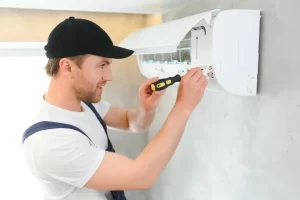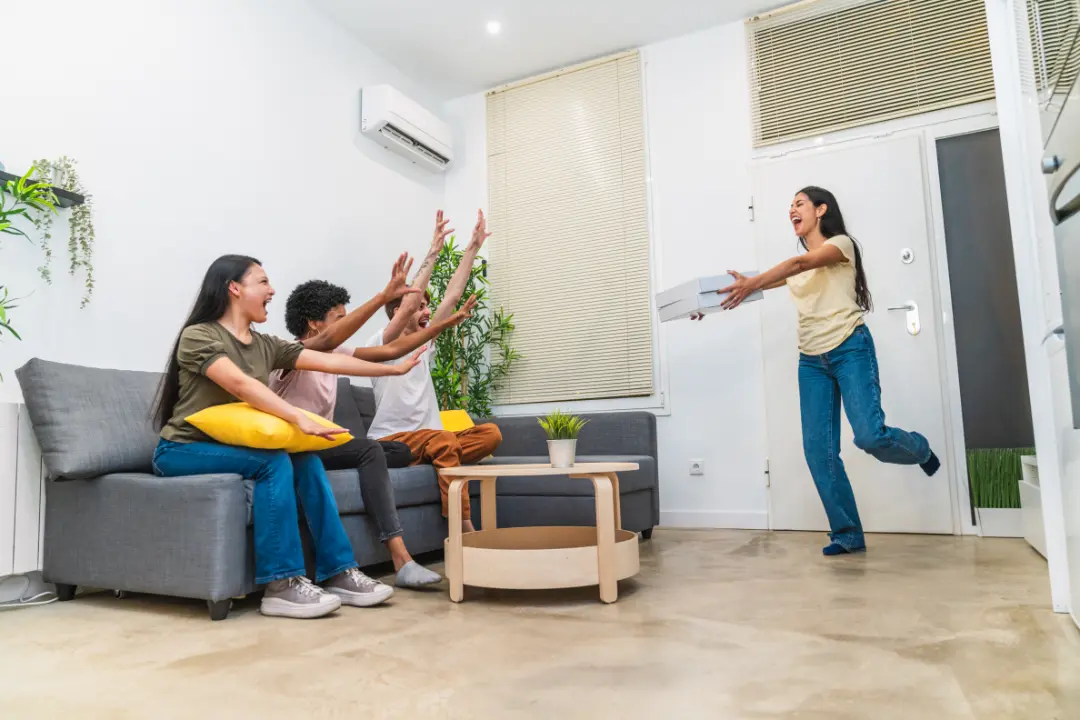If your air conditioning breaks down, you may be wondering, is my landlord responsible for fixing air conditioning? Generally, yes, landlords are responsible for repairing air conditioning units unless specified otherwise in the lease agreement. In this article, we’ll explore the common responsibilities of landlords and tenants regarding air conditioning maintenance and repairs and what to do if issues arise.
Key Takeaways
- Landlords are generally responsible for air conditioning repairs, while tenants must perform regular maintenance and promptly report issues, as outlined in relevant legislation and lease agreements.
- Lease agreements should explicitly detail responsibilities for air conditioning repairs to avoid future disputes, and tenants should carefully review and understand these terms before signing.
- Tenants may undertake urgent repairs if landlords are unresponsive but must follow legal procedures; regular maintenance like cleaning filters and inspecting systems ensures the efficiency and longevity of the air conditioning units.
Introduction
Navigating the web of landlord and tenant obligations can be as challenging as predicting the weather. Comprehending the respective roles of both parties in maintaining a rental property’s air conditioning system, including air conditioners and AC units, is imperative. Whether you’re just moving into a new rental property or have been leasing for years, the comfort of your living space is paramount, and a well-functioning air conditioner is a key piece of that puzzle.
The landlord typically has responsibility for air conditioning repairs, but the tenant’s role in maintaining the unit cannot be overstated. Consulting the relevant Residential Tenancies Act or similar legislation is vital, as the devil lies in the details. Being responsible for air conditioning and knowing the proper channels for repair requests can significantly simplify your rental experience.
Understanding Tenant and Landlord Responsibilities
In the dance of tenancy, tenants and landlords must move harmoniously to the tune of property maintenance. Landlords are generally responsible for ensuring the air conditioning units are in tip-top shape, while tenants are tasked with the proper maintenance and timely reporting of any issues. Referring to the pertinent legislation is necessary as these responsibilities can vary, and it’s best to avoid stepping on each other’s toes.
A functioning air conditioning system is a cornerstone of a safe and secure rental property. Landlords must repair installed air conditioning units unless the lease agreement states otherwise. However, if a tenant is responsible for damage due to negligence, the repair bill may fall into their lap. Understanding the ins and outs of your tenancy agreement and the property manager’s expectations is helpful and necessary.
Questions often arise about the responsibilities of air conditioning and repairs in rental properties. While landlords are typically responsible for fixing a broken air conditioner, the new tenant should be aware that their responsibility involves ensuring the regular maintenance and cleanliness of the unit. This symbiotic relationship between tenants and landlords ensures the efficient functioning and longevity of the air conditioning system.
Air Conditioner Maintenance: Who Does What?
When it comes to the care of air conditioning units, tenants and landlords each have a role to play. On the one hand, landlords must ensure the air conditioning system greets new tenants in excellent working order, usually by arranging an inspection and servicing at the beginning of a lease term. On the other, tenants must embrace their role in regular maintenance, such as cleaning air filters, which is foundational to the system’s effective operation.
Also, landlords are responsible for arranging regular professional maintenance to ensure the air conditioning system operates smoothly. The concern isn’t solely about comfort; it extends to prolonging the unit’s lifespan and guaranteeing peak performance. Major repairs or replacements, particularly those due to wear and tear, fall squarely on the shoulders of the landlord.

For tenants, the recipe for proper maintenance includes regular filter cleaning and the prompt reporting of any issues. Cleaning the air filter is as simple as wiping the inside and washing it every three months—think of it as a spa day for your air conditioner. This regular cleaning can prevent major repairs by maintaining air quality and the unit’s efficiency. And don’t forget, a stitch in time saves nine; promptly reporting maintenance issues can save both tenant and landlord from headaches down the road.
Lease Agreements and Air Conditioning Repairs
Lease agreements are the foundations upon which rental relationships are built, and they often hold the key to understanding responsibilities around air conditioning repairs. As a tenant, you’d be wise to scrutinise your lease agreement for any specific clauses about air conditioning before you sign on the dotted line. The document spells out who is responsible for what, and clarity here can save a world of trouble later on.
To circumvent future disagreements, make sure the lease explicitly outlines the landlord’s responsibility for air conditioner repairs. It’s not enough to assume; it must be written in black and white. If the lease is silent on the matter, don’t hesitate to raise the question and ask for it to be included. After all, an ounce of prevention is worth a pound of cure.
Remember that the lease agreement is not just a formality; it’s a legally binding document outlining both parties’ expectations and responsibilities. By reviewing it carefully, tenants and landlords can foster a positive relationship built on mutual understanding and respect for property maintenance.
Reporting Air Conditioning Issues
When the cool air stops flowing, it’s time to take action. Reporting any maintenance or performance issues with the air conditioning system should be done promptly and effectively. As a tenant, you want your landlord or property manager to address the problem swiftly so you can return to comfort immediately.

Written communication is key when requesting repairs. Not only does it provide a clear record of your request, but it also ensures there’s no miscommunication about the issue at hand. Keep copies of all correspondence and note the details of any phone calls—these records can be invaluable if you need to escalate the issue.
What if your written request is met with silence? If the landlord doesn’t respond within a reasonable timeframe, consider serving a breach notice. It’s a formal way of saying, “Hey, this is important, and it needs attention.” Effective communication is the lubricant that keeps the landlord-tenant relationship going smoothly.
What Happens When a Landlord Fails to Repair?
The tenant-landlord relationship can sometimes be turbulent, especially when urgent repairs are needed, and the landlord is nowhere to be found. Tenants must know their rights in these situations. Urgent repairs, like a broken air conditioner during a heatwave, typically need to be addressed within 24-48 hours, depending on state laws.
If you find yourself in a hot spot because your landlord is unresponsive, you may have the right to engage a tradesperson for urgent repairs up to a pre-approved amount. Should you find that your landlord is stubbornly refusing to repair the air conditioner, you can ask for a rent reduction or even take them to court. It’s a drastic step, but sometimes necessary to ensure your rights are respected.
If the landlord fails to meet its obligations, terminating the lease without penalty is an option, but remember, withholding rent is not. Always follow the legal process to ensure your protection, and keep in mind that every state has its own laws regarding these matters.
Importance of Regular Air Conditioner Maintenance
Routine air conditioner maintenance is important for several reasons, and air conditioning maintenance plays a crucial role in this process:
- It keeps the system running smoothly, ensuring tenant comfort.
- It helps safeguard the landlord’s investment by preventing costly repairs.
- It helps maintain the property’s value by keeping the air conditioner in good condition.
Ignoring the need for regular maintenance can lead to a decline in performance and increased energy use—not to mention the discomfort of living in a poorly regulated temperature. Cleaning and replacing air filters, for example, helps maintain unobstructed airflow, which is crucial for the air conditioner’s efficiency.

Proper maintenance of your air conditioning system includes:
- Cleaning the air filters regularly to prevent a reduction in airflow and heat absorption
- Keeping the evaporator coil clean to maintain optimal performance
- Tending to the outdoor condenser unit and surrounding area to prevent airflow blockages
- Consistent inspections and upkeep by professionals to ensure the long-term health of your air conditioning system.
Energy Consumption and Efficiency Tips
Every dollar saved on energy bills is a dollar that can be spent elsewhere. Tenants can play a significant role in reducing energy consumption without compromising on comfort. For instance, setting the thermostat to 25–27°C in summer and 18–20°C in winter can significantly affect energy usage.
Sealing gaps and cracks around windows and doors can prevent air leaks, which could reduce your energy bills by as much as 25%. And remember, ceiling or pedestal fans are your friends; they improve air circulation and reduce the need for air conditioning at a fraction of the cost.
Energy-efficient lighting, such as CFLs or LEDs, can also help halve your lighting costs. Turning off appliances at the wall when not in use can save you up to 10% on your electricity bills. These simple yet effective steps can help you achieve optimal performance from your air conditioning system while keeping costs down.
Smartway Air Conditioning: Your Go-To Service Provider
In the realm of air conditioning, SmartWay Air Conditioning distinguishes itself through its exceptional air conditioners installed, service, and maintenance. This Sydney-based provider brings over 30 years of experience to both residential and commercial properties, ensuring optimal functionality and efficiency in every job they undertake.
The certified HVAC professionals at Smartway Air Conditioning offer a comprehensive range of services, including:
- Installation of new HVAC systems
- Repair and maintenance of existing systems
- Air duct cleaning and sealing
- Indoor air quality testing and improvement
- Energy efficiency assessments
With its focus on customer satisfaction and commitment to quality workmanship, Smartway Air Conditioning can meet all your HVAC needs.
With a 100% satisfaction guarantee and competitive pricing, SmartWay Air Conditioning is the preferred choice for many in Sydney. They understand the importance of a reliable air conditioning system and are committed to providing high-quality service that meets all your needs.
Summary
Throughout this guide, we’ve explored the intricate dance of responsibilities between tenants and landlords when it comes to air conditioning maintenance and repairs. From the importance of regular upkeep to knowing your rights when repairs are neglected, we’ve covered the essential steps for ensuring a comfortable and hassle-free living environment.
As we conclude, remember that the key to a well-maintained air conditioning system lies in clear communication, understanding your lease agreement, and regular maintenance. Whether you’re a tenant or landlord, taking proactive steps to address air conditioning concerns will lead to a more harmonious tenancy and a cooler, more comfortable home.
Frequently Asked Questions
Who is typically responsible for air conditioning repairs in a rental property?
Typically, the landlord is responsible for air conditioning repairs in a rental property unless the lease agreement specifies otherwise. Tenants should regularly clean the unit and report any issues promptly.
What should I do if my air conditioner breaks down?
You should report the issue in writing to your landlord or property manager as soon as possible and keep a record of all communications regarding the repair request. Keeping a detailed record of these communications will help ensure that the issue is addressed promptly and effectively.
Can I withhold rent if my landlord doesn’t repair my air conditioner?
No, you cannot withhold rent if the landlord doesn’t repair your air conditioner. However, depending on state laws, you may have legal options, such as requesting a rent reduction or terminating the lease.
How often should I clean the air filter on my air conditioner?
You should clean the air filter on your air conditioner every three months to maintain air quality, improve efficiency, and prevent major repairs.
What are some ways I can reduce my air conditioning energy consumption?
You can reduce your air conditioning energy consumption by setting your thermostat to efficient temperatures, sealing gaps and cracks, using fans for better circulation, switching to energy-efficient lighting, and turning off appliances when not in use.


